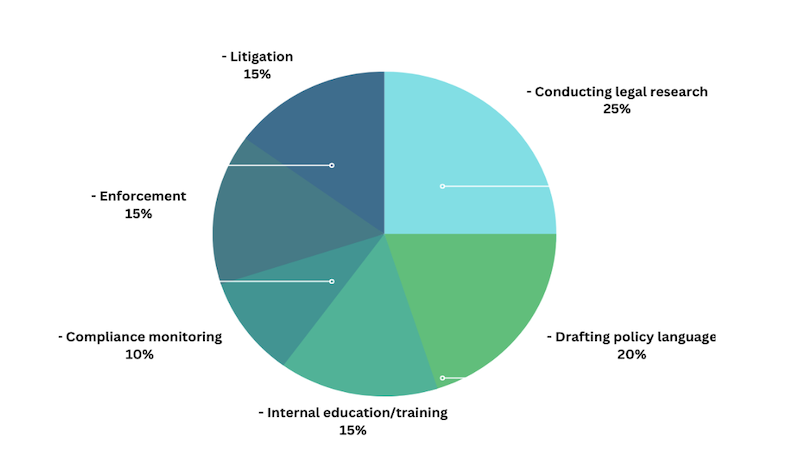As the demand for employment lawyers continues to rise, with the U.S. Bureau of Labor Statistics projecting a 10% growth from 2021 to 2031, their expertise has become indispensable in formulating legally sound workplace policies.
Recently, the hotel workers in Los Angeles went on strike demanding pay hikes due to the high housing costs. This serious strike, representing 11,000 workers had caught the attention of the whole country. When strikes can be one way of claiming your rights, you can also look out for an employment attorney to take it on your behalf to the court. With their support, you will find yourself getting educated in employment laws and ways to handle them. This goes the same for people of any part of the world. Being an employee, depending on employment lawyers to ensure your rights are always appreciable. And when it comes to complex matters like wage disputes, consider seeking assistance from experienced wage and hour attorneys in Los Angeles to navigate through the legal intricacies and protect your interests.
But how exactly do employment lawyers craft frameworks that not only comply with intricate laws but also balance the interests of both employers and employees?
This article explores the vital role of legal professionals in policy development, employment law’s fluctuating landscape, and legal strategies for constructing robust yet flexible legal frameworks.
The Crucial Role of Employment Lawyers in Policy Formulation
With projected job growth of 10% in the coming decade, employment lawyers are increasingly sought after to leverage their legal know-how in crafting organizational policies.
Their specialized expertise allows them to ensure alignment with federal and state employment laws that are continuously evolving. Instead of taking a one-size-fits-all approach, lawyers collaborate with HR to develop policies tailored to the unique needs and goals of each organization.
To make the most of legal guidance in policy development, organizations should engage employment law firms, like employment attorneys in Los Angeles, to establish more effective workplace regulations.
Rather than taking a one-size-fits-all approach, lawyers collaborate with HR to develop policies tailored to an organization’s unique needs and goals.
How Can Employment Lawyers Help?
Here are some specific responsibilities that demonstrate their indispensable expertise:
? Conducting an in-depth analysis of existing and proposed laws and regulations that may impact an organization’s policies and practices. This requires keeping current with all legislative and judicial developments.
? Identifying ambiguities, gaps, or potential conflicts between an organization’s current policies and legal requirements. Lawyers flag issues that could leave a company vulnerable to lawsuits.
Providing counsel and recommendations on modifying or introducing new policies to guarantee alignment with employment laws. Major legislative or court-ordered changes may require substantial revisions.

? Drafting policy language that is legally sound yet flexible enough to allow discretion in implementation. Policies with clarity and enforceability protect the organization while allowing accommodation of individual needs.
? Educating HR professionals and managers on new and existing policy provisions to ensure compliant and consistent enforcement across the organization. Lawyers are vital for clarifying complex legal nuances.
? Reviewing and approving major policy changes and new handbooks before internal dissemination and implementation. Their validation assures policies have undergone proper legal vetting.
? Representing the organization in legal proceedings related to workplace policies and practices. Their expertise in employment law enables lawyers to effectively defend the company’s interests.
Without proper guidance from knowledgeable wage and hour lawyers, organizations risk non-compliance, litigation, and the erosion of employee trust and engagement.
Navigating the Fluid Landscape of Employment Law
To effectively guide workplace policy formulation, employment lawyers must keep their finger on the pulse of the dynamic legal landscape. Key laws like the Fair Labor Standards Act, Americans with Disabilities Act, and Title VII of the Civil Rights Act each have intricate requirements that lawyers must monitor closely.
For instance, the FLSA mandates a federal minimum wage of $7.25 per hour. However, it’s worth noting that certain state laws require even higher minimums that employees are entitled to. This is just one example of the complex web of federal, state, and local laws that lawyers must unravel.
Equally significant are major court decisions that can have far-reaching implications for workplace policies, addressing issues such as religious accommodations, LGBTQ+ discrimination, paid leave, and more. Lawyers analyze rulings to determine necessary policy updates that align with legal precedents.
Overall, the shifting legal terrain demands constant vigilance and expertise to craft evolving policy frameworks.
Lawyers’ Strategies for Developing Legally Robust Policies
To formulate policies that hold up legally while supporting organizational and employee needs, lawyers employ several key strategies:
Continuous analysis of legal updates:
Lawyers stay on top of legislative and regulatory changes through resources like the American Bar Association’s manuals on laws including the FLSA and NLRA. These treatises offer invaluable insights for policy development.
Close collaboration with HR:
Rather than operating in silos, lawyers work hand-in-hand with HR professionals to ensure policies reflect both legal requirements and business objectives. This integrated approach results in well-rounded frameworks.
Addressing potential pitfalls:
Lawyers use their expertise to flag any policy gaps or gray areas that could expose companies to legal jeopardy. They provide recommendations to reinforce policies where needed.
Balancing interests:
While ensuring legal compliance, lawyers also aim to develop win-win policies that protect employers from liability while supporting employee satisfaction and engagement.

Case Study:
Supreme Court Rulings Impacting Policies
To see how judicial decisions directly shape workplace policies, let’s examine some key Supreme Court rulings and their implications:
– In _EEOC v. Abercrombie & Fitch _(2015), the Court ruled that employers have a responsibility under Title VII of the Civil Rights Act to accommodate an employee’s religious practices, even if unaware of the need for accommodation. This precedent requires employers to proactively adapt policies on dress codes, work schedules, and other areas as needed to enable religious freedom.
– In _Bostock v. Clayton County_ (2020), the Court decided that discrimination based on sexual orientation and gender identity is prohibited under Title VII’s ban on sex discrimination. This monumental decision necessitated immediate policy updates to ensure LGBTQ+ protections.
– In _Dobbs v. Jackson Women’s Health Organization_ (2022), the Court overturned the constitutional right to abortion access established in _Roe v. Wade_. As a result, organizations have had to re-evaluate policies on employee benefits, time off, and travel reimbursements related to reproductive healthcare.
As these examples demonstrate, legal decisions can dictate major policy overhauls that employment lawyers are instrumental in guiding.
Employment Law Updates
When it comes to analyzing legal developments, lawyers don’t work alone. Organizations like the Society for Human Resource Management (SHRM) are also valuable resources. SHRM’s Workplace Compliance e-newsletter provides regular updates on new legislation, regulations, and court rulings that impact workplace policies.
Other reputable sources like the National Labor Relations Board (NLRB) and the Equal Employment Opportunity Commission (EEOC) share news and guidance to inform employment lawyers and HR professionals as they maintain legally compliant frameworks.
Staying plugged into these goto resources enables lawyers to provide timely counsel in modifying policies based on new precedents and requirements.
Conclusion
With employment laws continuously evolving, the expertise of lawyers is indispensable in interpreting legal shifts and ensuring workplace policies remain compliant.
By monitoring regulatory and judicial developments, collaborating with HR, and focusing on legally sound yet flexible frameworks, employment lawyers enable organizations to protect themselves while supporting employees. Keeping policies updated is crucial for avoiding legal jeopardy in today’s dynamic landscape.
FAQs on Legal Guidance for Workplace Policies
1. How often should organizations review policies for needed legal updates?
Legal experts generally recommend reviewing policies at least annually. More frequent reviews may be warranted in times of active legislative or judicial changes.
2. What are the potential consequences of non-compliance for employers?
Possible ramifications include lawsuits, fines, settlements, damaged employer brand and culture, and strained employee relations and retention.
3. How do lawyers and HR work together on policy development?
Lawyers provide legal guidance, while HR incorporates business objectives and employee considerations. Close collaboration allows them to shape integrated frameworks.




